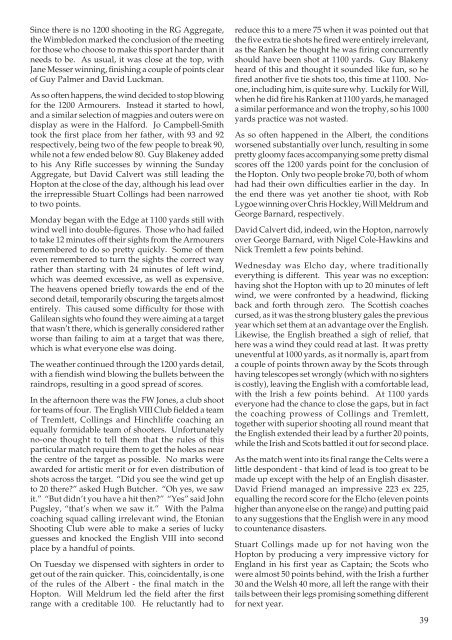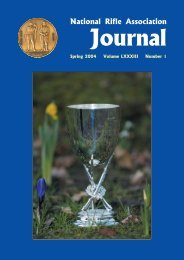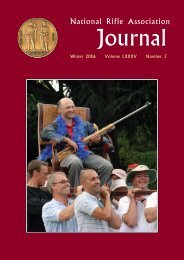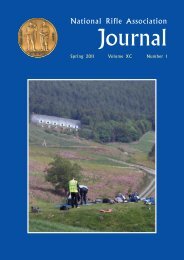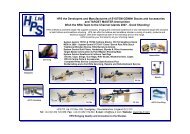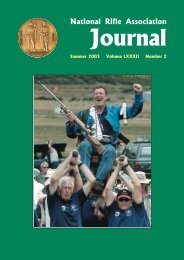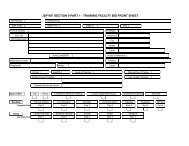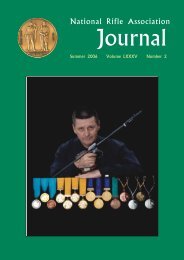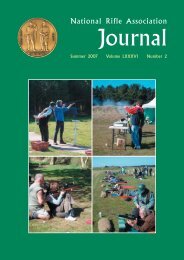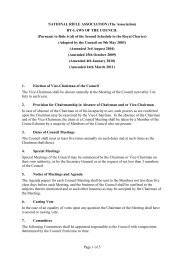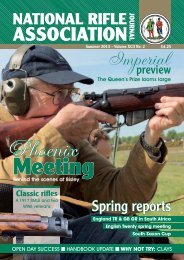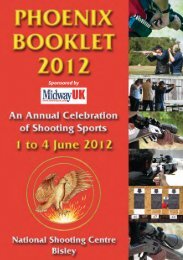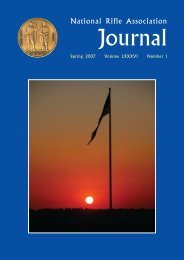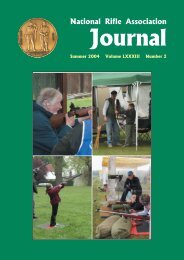Winter 2002 - National Rifle Association
Winter 2002 - National Rifle Association
Winter 2002 - National Rifle Association
- No tags were found...
You also want an ePaper? Increase the reach of your titles
YUMPU automatically turns print PDFs into web optimized ePapers that Google loves.
Since there is no 1200 shooting in the RG Aggregate,the Wimbledon marked the conclusion of the meetingfor those who choose to make this sport harder than itneeds to be. As usual, it was close at the top, withJane Messer winning, finishing a couple of points clearof Guy Palmer and David Luckman.As so often happens, the wind decided to stop blowingfor the 1200 Armourers. Instead it started to howl,and a similar selection of magpies and outers were ondisplay as were in the Halford. Jo Campbell-Smithtook the first place from her father, with 93 and 92respectively, being two of the few people to break 90,while not a few ended below 80. Guy Blakeney addedto his Any <strong>Rifle</strong> successes by winning the SundayAggregate, but David Calvert was still leading theHopton at the close of the day, although his lead overthe irrepressible Stuart Collings had been narrowedto two points.Monday began with the Edge at 1100 yards still withwind well into double-figures. Those who had failedto take 12 minutes off their sights from the Armourersremembered to do so pretty quickly. Some of themeven remembered to turn the sights the correct wayrather than starting with 24 minutes of left wind,which was deemed excessive, as well as expensive.The heavens opened briefly towards the end of thesecond detail, temporarily obscuring the targets almostentirely. This caused some difficulty for those withGalilean sights who found they were aiming at a targetthat wasn’t there, which is generally considered ratherworse than failing to aim at a target that was there,which is what everyone else was doing.The weather continued through the 1200 yards detail,with a fiendish wind blowing the bullets between theraindrops, resulting in a good spread of scores.In the afternoon there was the FW Jones, a club shootfor teams of four. The English VIII Club fielded a teamof Tremlett, Collings and Hinchliffe coaching anequally formidable team of shooters. Unfortunatelyno-one thought to tell them that the rules of thisparticular match require them to get the holes as nearthe centre of the target as possible. No marks wereawarded for artistic merit or for even distribution ofshots across the target. “Did you see the wind get upto 20 there?” asked Hugh Butcher. “Oh yes, we sawit.” “But didn’t you have a hit then?” “Yes” said JohnPugsley, “that’s when we saw it.” With the Palmacoaching squad calling irrelevant wind, the EtonianShooting Club were able to make a series of luckyguesses and knocked the English VIII into secondplace by a handful of points.On Tuesday we dispensed with sighters in order toget out of the rain quicker. This, coincidentally, is oneof the rules of the Albert - the final match in theHopton. Will Meldrum led the field after the firstrange with a creditable 100. He reluctantly had toreduce this to a mere 75 when it was pointed out thatthe five extra tie shots he fired were entirely irrelevant,as the Ranken he thought he was firing concurrentlyshould have been shot at 1100 yards. Guy Blakenyheard of this and thought it sounded like fun, so hefired another five tie shots too, this time at 1100. Noone,including him, is quite sure why. Luckily for Will,when he did fire his Ranken at 1100 yards, he manageda similar performance and won the trophy, so his 1000yards practice was not wasted.As so often happened in the Albert, the conditionsworsened substantially over lunch, resulting in somepretty gloomy faces accompanying some pretty dismalscores off the 1200 yards point for the conclusion ofthe Hopton. Only two people broke 70, both of whomhad had their own difficulties earlier in the day. Inthe end there was yet another tie shoot, with RobLygoe winning over Chris Hockley, Will Meldrum andGeorge Barnard, respectively.David Calvert did, indeed, win the Hopton, narrowlyover George Barnard, with Nigel Cole-Hawkins andNick Tremlett a few points behind.Wednesday was Elcho day, where traditionallyeverything is different. This year was no exception:having shot the Hopton with up to 20 minutes of leftwind, we were confronted by a headwind, flickingback and forth through zero. The Scottish coachescursed, as it was the strong blustery gales the previousyear which set them at an advantage over the English.Likewise, the English breathed a sigh of relief, thathere was a wind they could read at last. It was prettyuneventful at 1000 yards, as it normally is, apart froma couple of points thrown away by the Scots throughhaving telescopes set wrongly (which with no sightersis costly), leaving the English with a comfortable lead,with the Irish a few points behind. At 1100 yardseveryone had the chance to close the gaps, but in factthe coaching prowess of Collings and Tremlett,together with superior shooting all round meant thatthe English extended their lead by a further 20 points,while the Irish and Scots battled it out for second place.As the match went into its final range the Celts were alittle despondent - that kind of lead is too great to bemade up except with the help of an English disaster.David Friend managed an impressive 223 ex 225,equalling the record score for the Elcho (eleven pointshigher than anyone else on the range) and putting paidto any suggestions that the English were in any moodto countenance disasters.Stuart Collings made up for not having won theHopton by producing a very impressive victory forEngland in his first year as Captain; the Scots whowere almost 50 points behind, with the Irish a further30 and the Welsh 40 more, all left the range with theirtails between their legs promising something differentfor next year.39


